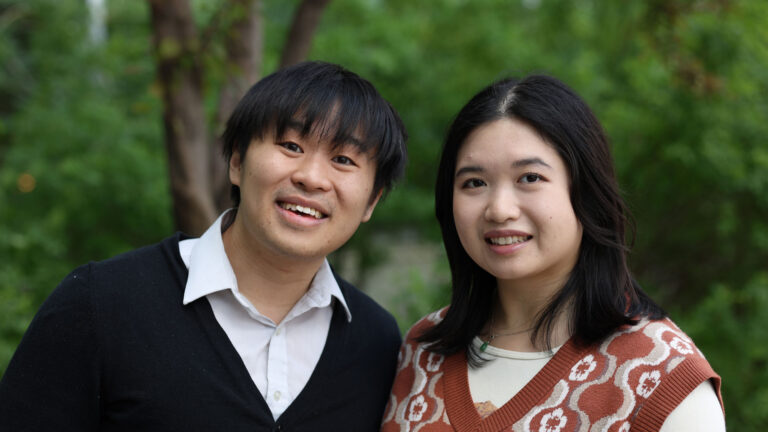
During Pride Season, 2SLGBTQI+ communities and allies come together to spotlight the resilience, celebrate the talent, and recognize the contributions of 2SLGBTQI+ communities. Pride Season is an opportunity for pharmacy teams to reflect on how they can create inclusive and welcoming spaces to facilitate quality person-centred care, recognizing that each patient is an individual with their own values, needs, and health concerns.
For Sarah Phan and Joseph Lam, the question of how pharmacy can be more inclusive and welcoming for 2SLGTBQIA+ patients and team members has been front of mind. Sarah and Joseph are both third-year students in the University of Alberta’s PharmD program. They are also the co-presidents of the LGBTQ+ Pharmacy Students Club.
This student-led initiative facilitates educational and social events that are geared towards 2SLGTBQIA+-identifying individuals, self-identified allies, and the general student body to educate, empower, and celebrate the 2SLGTBQIA+ communities.
Sarah joined the LGBTQ+ Pharmacy Students Club as the VP Internal and found she was drawn to the club’s potential for advocacy work.
“I ended up being a lot more involved in the club than I originally thought—the club gave me the chance to support and serve my peers and advocate for the 2SLGBTQI+ community,” she said.
Joseph attended a few of the club’s events and found he wanted to help nurture the sense of community the club created.
“I had attended a few events and that sparked a desire to help the club grow and have more of a presence. Becoming the co-president also presented more opportunity to advocate for the community,” he said.
Joseph and Sarah both credit their friendship and the support of their executive members, Jin and Vincent, to the continued success and growth of the club. They reflected on how their executive committee has worked hard to foster inclusion on campus and beyond.
“One of our main strategies is to provide a safe space for students who identify in the community and for allies,” said Sarah. “We try to organize at least one event per month for students to connect with each other and get to know each other outside of an academic context.”
Joseph added that their focus has recently expanded to include more advocacy work.
“We have started focusing more on advocacy and offering educational events about inclusive care to help educate anyone who is interested in trying to make pharmacies more welcoming and safe,” he said.
For pharmacy teams that are looking for ways to create a safer space for their 2SLGTBQIA+ patients, Joseph said it doesn’t have to be complicated.
“Making your pharmacy more welcoming can start with something as simple as having visible markers of support in the patient services area,” he said. “Having a pride flag on display or having pronouns on nametags can go a long way in making patients feel more comfortable.”
Sarah added that there is also value in taking a look at your pharmacy’s tools and resources.
“Taking that extra step to incorporate gender identity into patient cases and materials is another way to make care more inclusive for queer and gender-diverse patients,” she said.
While these visible markers of inclusivity are important aspects of making pharmacy spaces more welcoming, both Sarah and Joseph agreed the most important aspect of providing inclusive care is having a positive and open mindset.
“I’ve learned how important it is to have a sense of curiosity and an openness to learning. I know many folks out there are nervous about making mistakes and it is so important to make a real effort to be respectful and to not misgender or deadname individuals in the community, said Sarah. “But ultimately, if you don’t try, you won’t learn, and it is so important to make a continual effort to learn and develop the skills needed to provide each patient with the best possible care.”
ACP’s Standards of Practice for Pharmacists and Pharmacy Technicians (SPPPT) are centred around the provision of person-centred care, wherein regulated members must
- recognize and value the diversity of patients and ensure they have access to quality pharmacy care,
- support the principles of equity in the delivery of professional services,
- respect the dignity and rights of every individual without prejudice, and
- acknowledge that health inequity exists.
This list, while not comprehensive, provides an overview of how regulated members are expected to centre the individual in their care. It is important for pharmacy teams to reflect on how they prioritize person-centred care for their 2SLGBTQI+ patients.
One way to improve person-centred care is to stay informed.
“Making an effort to be informed about issues that impact the 2SLGBTQI+ community improves patient outcomes,” said Joseph. “Having an open mind, being curious, and staying informed—especially on policies that impact queer patients—can make patients feel safe, supported, and welcome in the pharmacy. Patients can sense when you’re approaching things with a desire to be informed and provide optimal patient care.”
Looking towards the future, both Sarah and Joseph plan to continue to advocate for the 2SLGBTQI+ community once they graduate and enter the next stage of their careers.
“My goal is to work in community pharmacy so I can work with different folks from all walks of life. I want to continue to foster an environment of openness and support in the pharmacy,” said Joseph.
Sarah agreed, saying she plans to continue working with the community in some capacity.
“I really want to centre my career around serving the 2SLGBTQI+ community, whether that is working directly with patients from the community or working in areas of medicine that have disproportionately impacted these patients,” she said.
Sarah and Joseph are advocates and leaders whose efforts will continue to make pharmacy practice safer and more inclusive for 2SLGBTQI+ patients. During Pride Season and beyond, all regulated members are encouraged to reflect on how they can make their practices inclusive and welcoming spaces where all patients receive quality person-centred care.
Looking to learn more?
- Safe and inclusive care for every patient (Alberta College of Pharmacy)
- Smashing Stigma: A Guide to LGBT2SQ-friendly Language (Canadian Pharmacists Association)
- 10 Actions for Creating an Inclusive Pharmacy Space (Canadian Pharmacists Association)
- Affirming and Inclusive Language Tips (Egale)
- Two-Spirit Learning Resources (University of the Fraser Valley)




